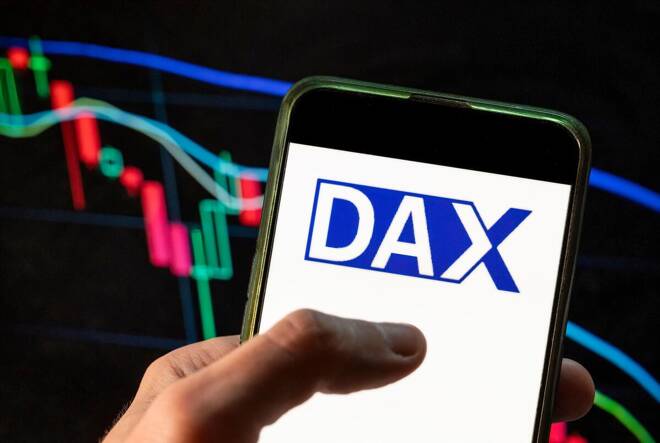Advertisement
Advertisement
DAX Index: Focus on Eurozone Trade and US Retail Sales: How Will They Impact DAX?
By:
US CPI report propels DAX beyond 15,500, reshaping the landscape for Dax stocks ahead of Eurozone trade and US retail sales numbers on Wednesday.
Highlights
- The DAX rallied 1.76% on Tuesday, ending the session at 15,614.
- US inflation figures shut the door on Fed rate hikes on Tuesday, driving demand for riskier assets on Tuesday.
- On Wednesday, Eurozone industrial production and trade figures will draw interest before another pivotal US session.
Tuesday DAX Overview
The DAX rallied 1.76% on Tuesday. Following a 0.73% gain on Monday, the DAX ended the day at 15,614.
Euro Area Stats Raise Hopes of a Shallow Recession
On Tuesday, Eurozone economic indicators failed to spook investors despite an economic contraction. Better-than-expected ZEW Economic Sentiment figures for Germany and the Eurozone countered the Q3 GDP numbers. Improving sentiment toward the respective economies raised hope of a short-lived recession.
US CPI Report Sends the DAX Beyond 15,500
The US CPI Report for October fueled demand for riskier assets, with the DAX surging to a session high of 15,632 before easing back.
The softer-than-expected inflation figures raised bets on the Fed ending its Fed rate hike cycle.
On Tuesday, the US equity markets also responded to the CPI Report. The Nasdaq Composite Index rallied 2.37%, with the Dow and S&P 500 seeing gains of 1.43% and 1.91%, respectively.
10-year US Treasury yields tumbled 4.11% to end the session at 4.451%.
The Tuesday Market Movers
Retailer Zalando SE surged 10.01%, with Sartorius AG and Vonovia seeing gains of 8.03% and 8.00%, respectively. Easing bets on Fed rate hikes supported consumer and tech stocks. Adidas rallied 5.26%.
The German auto sector made further gains on sentiment toward Fed interest rates. Porsche and Volkswagen gained 3.51% and 2.65%. BMW and Mercedes Benz Group increased by 2.25% and 2.46%, respectively.
Eurozone Industrial Production and Trade in Focus
On Wednesday, the Eurozone economy will be in the spotlight again. Eurozone trade data and industrial production figures for September will garner investor interest. The trade figures will likely draw more interest, with investors looking for signs of a pickup in demand. Beyond the trade balance, exports with key trading partners also need consideration.
Economists forecast the Eurozone trade surplus to widen from €6.7 billion to €22.3 billion in September.
US Retail Sales and Producer Prices in the Spotlight
Later in the Wednesday session, US retail sales and producer prices will give investors a snapshot of the demand environment. A larger-than-expected fall in retail sales could reignite fears of a hard landing. Economists forecast retail sales to fall 0.3% in October after a 0.7% increase in September.
After the US CPI Report, producer prices will also need consideration. A weaker demand environment could force producers to reduce prices to win contracts. Producer prices influence consumer price trends.
Economists forecast producer prices to increase by 0.1% in October after a 0.5% increase in September.
The futures markets point to a slow start to the Wednesday session. The DAX and the Nasdaq mini were up 3 and 46 points, respectively.
Short-Term Forecast
US economic indicators will influence market risk sentiment as the focus turns to macroeconomics. An unexpected slump in US retail sales would cement bets on the Fed holding interest rates unchanged. However, a US economic recession would affect the buyer appetite for DAX-listed stocks.
DAX Technical Indicators
Daily Chart
The DAX sat above the 50-day and 200-day EMAs, sending bullish price signals.
A DAX break above the 15,694 resistance level would support a move toward 15,800.
Better-than-expected Eurozone trade data and US retail sales figures could support a positive session.
However, a slide in Eurozone exports and a slump in US retail sales could fuel recessionary jitters. A fall through the 15,477 support level would give the bears a run at the 200-day EMA.
The 14-day RSI reading of 65.52 indicates a DAX break above the 15,694 resistance level before entering overbought territory.
4-Hourly Chart
The DAX at above the 50-day and 200-day EMAs, the EMAs affirming bullish price signals.
A DAX break above the 15,694 resistance level would support a move toward 15,800.
However, a fall through the 15,477 support level would give the bears a run at the 200-day EMA.
The 77.27 14-4 hour RSI shows the DAX in overbought territory. Selling pressure could intensify at the 15,694 resistance level.
For a look at the economic events, check out our economic calendar.
About the Author
Bob Masonauthor
With over 28 years of experience in the financial industry, Bob has worked with various global rating agencies and multinational banks. Currently he is covering currencies, commodities, alternative asset classes and global equities, focusing mostly on European and Asian markets.
Advertisement
